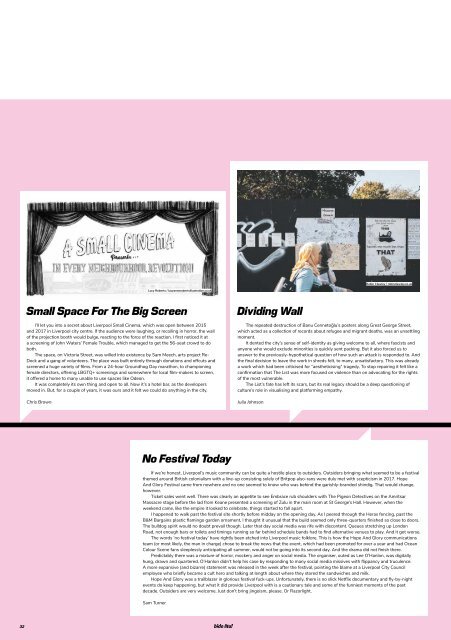Issue 106 / Dec 2019/Jan 2020
December 2019/January 2020 double issue of Bido Lito! magazine. Featuring: BEIJA FLO, ASOK, LO FIVE, SIMON HUGHES, CONVENIENCE GALLERY, BEAK>, STUDIO ELECTROPHONIQUE, ALEX TELEKO, SHE DREW THE GUN, IMTIAZ DHARKER and much more.
December 2019/January 2020 double issue of Bido Lito! magazine. Featuring: BEIJA FLO, ASOK, LO FIVE, SIMON HUGHES, CONVENIENCE GALLERY, BEAK>, STUDIO ELECTROPHONIQUE, ALEX TELEKO, SHE DREW THE GUN, IMTIAZ DHARKER and much more.
You also want an ePaper? Increase the reach of your titles
YUMPU automatically turns print PDFs into web optimized ePapers that Google loves.
Robin Clewley / robinclewley.co.uk<br />
Lucy Roberts / lucyannerobertsillustration.co.uk<br />
Small Space For The Big Screen<br />
I’ll let you into a secret about Liverpool Small Cinema, which was open between 2015<br />
and 2017 in Liverpool city centre. If the audience were laughing, or recoiling in horror, the wall<br />
of the projection booth would bulge, reacting to the force of the reaction. I first noticed it at<br />
a screening of John Waters’ Female Trouble, which managed to get the 56-seat crowd to do<br />
both.<br />
The space, on Victoria Street, was willed into existence by Sam Meech, arts project Re-<br />
Dock and a gang of volunteers. The place was built entirely through donations and offcuts and<br />
screened a huge variety of films. From a 24-hour Groundhog Day marathon, to championing<br />
female directors, offering LBGTQ+ screenings and somewhere for local film-makers to screen,<br />
it offered a home to many unable to use spaces like Odeon.<br />
It was completely its own thing and open to all. Now it’s a hotel bar, as the developers<br />
moved in. But, for a couple of years, it was ours and it felt we could do anything in the city.<br />
Chris Brown<br />
Dividing Wall<br />
The repeated destruction of Banu Cennetoğlu’s posters along Great George Street,<br />
which acted as a collection of records about refugee and migrant deaths, was an unsettling<br />
moment.<br />
It dented the city’s sense of self-identity as giving welcome to all, where fascists and<br />
anyone who would exclude minorities is quickly sent packing. But it also forced us to<br />
answer to the previously-hypothetical question of how such an attack is responded to. And<br />
the final decision to leave the work in shreds felt, to many, unsatisfactory. This was already<br />
a work which had been criticised for “aestheticising” tragedy. To stop repairing it felt like a<br />
confirmation that The List was more focused on violence than on advocating for the rights<br />
of the most vulnerable.<br />
The List’s fate has left its scars, but its real legacy should be a deep questioning of<br />
culture’s role in visualising and platforming empathy.<br />
Julia Johnson<br />
No Festival Today<br />
If we’re honest, Liverpool’s music community can be quite a hostile place to outsiders. Outsiders bringing what seemed to be a festival<br />
themed around British colonialism with a line-up consisting solely of Britpop also-rans were duly met with scepticism in 2017. Hope<br />
And Glory Festival came from nowhere and no one seemed to know who was behind the garishly-branded shindig. That would change,<br />
however.<br />
Ticket sales went well. There was clearly an appetite to see Embrace rub shoulders with The Pigeon Detectives on the Amritsar<br />
Massacre stage before the lad from Keane presented a screening of Zulu in the main room at St George’s Hall. However, when the<br />
weekend came, like the empire it looked to celebrate, things started to fall apart.<br />
I happened to walk past the festival site shortly before midday on the opening day. As I peered through the Heras fencing, past the<br />
B&M Bargains plastic flamingo garden ornament, I thought it unusual that the build seemed only three-quarters finished so close to doors.<br />
The bulldog spirit would no doubt prevail though. Later that day social media was rife with discontent. Queues stretching up London<br />
Road, not enough bars or toilets and timings running so far behind schedule bands had to find alternative venues to play. And it got worse.<br />
The words ‘no festival today’ have rightly been etched into Liverpool music folklore. This is how the Hope And Glory communications<br />
team (or most likely, the man in charge) chose to break the news that the event, which had been promoted for over a year and had Ocean<br />
Colour Scene fans sleeplessly anticipating all summer, would not be going into its second day. And the drama did not finish there.<br />
Predictably there was a mixture of horror, mockery and anger on social media. The organiser, outed as Lee O’Hanlon, was digitally<br />
hung, drawn and quartered. O’Hanlon didn’t help his case by responding to many social media missives with flippancy and truculence.<br />
A more expansive (and bizarre) statement was released in the week after the festival, pointing the blame at a Liverpool City Council<br />
employee who briefly became a cult hero and talking at length about where they stored the sandwiches and milk.<br />
Hope And Glory was a trailblazer in glorious festival fuck-ups. Unfortunately, there is no slick Netflix documentary and fly-by-night<br />
events do keep happening, but what it did provide Liverpool with is a cautionary tale and some of the funniest moments of the past<br />
decade. Outsiders are very welcome. Just don’t bring jingoism, please. Or Razorlight.<br />
Sam Turner<br />
32

















